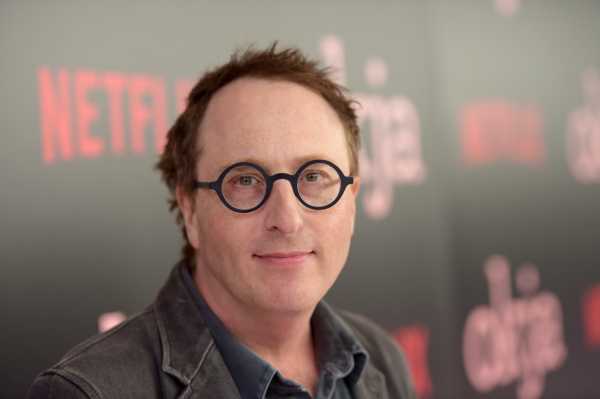
Journalist Jon Ronson describes his new podcast series, The Butterfly Effect, this way: “It’s about what constitutes a reputable person and what constitutes a disreputable person.”
More specifically, The Butterfly Effect is a four-hour, seven-part exploration of the impact of the tech industry on the porn industry. It’s about the way free porn sites, notably PornHub, have made it very hard for porn workers to make a living.
The music industry has gone through similar upheaval, but musicians get more sympathy than porn actors (and can make money doing live gigs), Ronson says.
In the podcast, Ronson interviews Fabian Thylmann, PornHub’s millionaire founder, along with a spectrum of sex industry performers and creators struggling to make ends meet. For instance, Ronson profiles Mike Quasar, a porn cameraman and director, who tells Ronson he’s powerless to stop his films from being instantly pirated online. (The volume of streaming sites and sharing methods makes it hard for porn companies, often strapped for resources, to fight piracy.) Some porn stars make niche custom videos — performing content in ways requested by specific fans, for a fee — in order to survive financially.
For two decades since Them, a best-seller on extremists, Ronson has been creating engaging, funny accounts of people on society’s margins. The Welshman turned New Yorker’s last book was So You’ve Been Publicly Shamed, about the internet pile-ons against the likes of inappropriate tweeter Justine Sacco.
In a wide-ranging conversation — lightly edited and condensed — Ronson discussed porn’s future, Alex Jones, and legitimized bullying.
Alexander Bisley
So these sites like PornHub, which are stealing porn and giving it away for free, have wildly depressed the money available for productions and the fees the performers are able to get, right?
Jon Ronson
Yes. So a lot of people are making a lot less money and are working much, much longer hours to make that money. That’s happening a lot. Whereas the people in charge of PornHub are making so much money they don’t know what to do with it.
These tech people who’ve never set foot on a porn set in their lives, these optimizers and algorithm people and AB testers, these “respectable people” — they’re the ones who seem to be causing the most trouble [in] the lives of porn performers.
I saw time and time again, people [in the porn industry] would have to move from pretty nice houses to much smaller houses. Porn performers have to go into escorting to pay the rent. More and more producers are going out of business. So in many ways it’s decimating the San Fernando Valley, but the tech people are doing very well.
The tech takeover of the world isn’t being criticized enough. It’s having these seismic changes, and people tend not to think about it because they’re giving the world what it wants, which is free porn.
Alexander Bisley
What do you think the future of porn will be, given this seismic shift?
Jon Ronson
I was just reading a comment on Slate that addressed this question. The commenter — Allen Garvin — wrote, “Dirty magazines are dying, porn shops are dying, mainstream porn video companies are dying (or else getting into extreme fetishes). People that go to porn conventions or show up at strip clubs to see specific porn actresses are getting older each year, with young men failing to replace them because they get their porn for free.”
I think all that’s true. So what will take its place? Amateur porn shot on cellphones. Some of those people will get deals with PornHub, and the like, where they’ll make some money from clicks, but it’ll be a fraction of what they would have made in the pre-streaming days.
And the people who built the industry? Some will move into customs and niche fetish stuff; most others will just vanish away into the ether.
Alexander Bisley
One of PornHub’s tech guys, exploiting performers’ work, boasted to you: “I’m not a piece of garbage, peddling smut.”
Jon Ronson
When I ask him about the people whose lives were being decimated as a result of the business practices, he went, “Ugh, okay. Their livelihood.” He talked like a tech utopian, somebody who thinks the tech world can do no wrong. A lot of tech people go out of their way to not think about the negative consequences. You shouldn’t not think about those insidious consequences.
Alexander Bisley
Tech guys like the one you quote above basically dehumanize the labor?
Jon Ronson
Yeah. In the same way we dehumanize people that we tear apart on social media. Or in the same way that despots from the past dehumanized their victims. We just don’t wanna think about it. And that’s one of the reasons my public shaming book got some backlash, because people didn’t want to be confronted with the truth of the psychological tricks they play on themselves to not feel bad about the bad things they do.
Alexander Bisley
Since Them: Adventures With Extremists, your book and documentary series about conspiracy theorists, the idea of humanizing the dehumanized has featured in your work. Alex Jones, a far-right conspiracy theorist that has interviewed Trump on his show, was one of your early subjects, both in writing and in documentary. Did you go too far in humanizing him?
Jon Ronson
I’ve thought a lot about this, and I think Alex has changed. Alex is a different person now compared to how he was when I first knew him in the late ’90s. A lot of people who work for Alex would probably say the same thing. So the way we should regard him, the way we should write about him, should change. He’s changed partly because he’s more powerful now, and he’s richer, and he’s got an ally in the White House, and some of his conspiracy theories have got darker.
A couple of years ago, when Alex suddenly made a fortune from the Super Male Vitality supplements and so on, that’s pretty much exactly the same time that his discourse got more aggressive. As much as he denies saying that Sandy Hook didn’t happen, he did promote that conspiracy theory.
Alexander Bisley
How do you feel about the future of media?
Jon Ronson
I strongly believe the future for that industry of broadcasters is to welcome idiosyncratic voices and then just give them the freedom to do just that, which is exactly what Netflix did with Bong Joon-Ho for Okja, a film I co-wrote, and what Audible did with me and The Butterfly Effect. The days of gatekeepers making you jump through hoops is kinda over.
Alexander Bisley
The Australian writer Christos Tsiolkas, author of The Slap, wrote a compelling essay about the Internet zeitgeist. “I have become increasingly wary of morality disguised as politics and of our reversion to a language redolent of sin and shaming, certainty and righteousness.”
Jon Ronson
Yeah. The way I would describe it is legitimized bullying. The destruction of people like Justine Sacco [who tweeted an inappropriate joke that launched a viral pile-on and that led to her being fired] — what of social justice? It was a cathartic alternative to social justice.
When you’re bullied in school, quite often, you’re bullied by everyone. You don’t have friends to turn to. Monica Lewinsky, in an interview I did with her, told me of her scandal: “I was hung out to dry by everyone; I didn’t belong to any group.” That’s the same as what happened to Justine Sacco — she was hung out to dry by everyone: Misogynists hated her, philanthropists hated her, social justice people hated her, Donald Trump tweeted about her. So that’s probably why I felt so animated about that story … because it reminded me of school. When you’re being bullied by everybody, it’s legitimized bullying.
In a way, it’s the reason I wanted to do The Butterfly Effect as well. Because it’s a story about every time somebody watches porn for free on PornHub, they are potentially exploiting the lives of the porn people they’re watching.
Alexander Bisley
David Simon, creator of the sex work–themed television show The Deuce, believes a big problem with porn and sex work is poor labor rights.
Jon Ronson
Definitely in terms of royalties, back-end and stuff like that, porn people would agree with David Simon. Where they might disagree is that there’s definitely a narrative out there about porn people being forced to do things they don’t want to do on set by exploitative directing. Maybe their boyfriends were coercing them in some cases. But I can say that the side of the San Fernando Valley industry that we were in for a year on and off [making The Butterfly Effect], I saw nothing like that. That may happen in Miami and Las Vegas.
But the [Valley] directors and the producers and the other porn actors — it’s basically a kindhearted and respectful community, certainly more than outsiders might think. It has its problems, but it’s way more collegiate than outsiders would think it.
Alexander Bisley
What might surprise listeners about The Butterfly Effect?
Jon Ronson
Probably the most surprising thing about the series is how moving and endearing it gets. How supportive the performers are to each other. And in the world of custom, in the world of bespoke porn, how there’s this really lovely bond between the cast and producers and their client, their fans. A bunch of people have said they’ve never thought that a series about the tech takeover of the porn industry would make them cry, but the end of the series will make you cry.
Alexander Bisley
And challenge them?
Jon Ronson
There’s this amazing line in episode five of The Butterfly Effect where I’m talking to this girl who was a big porn watcher, and I said to her: “Did you ever learn their names?” And she said: “No, I never learned their names. It’s like when you kill a deer; you don’t name it because then you can’t eat it.”
Alexander Bisley
In addition to the pressure for some of them to work as escorts, porn stars have to be an enthusiastic brand all over social media. Is that a challenge?
Jon Ronson
Yes! In episode two I meet this woman called Maci May who was having a terrible time, and she used to vent about it on social media but now she’s much more wary because you have to be like a brand. She can’t tweet, “I don’t have any money.” She’s discouraged from acting that way by porn producers and directors who say to her: “No, no, you’ve got to constantly be chirpy and happy.”
When she said that to me, I thought, “That’s really sad.” In a parallel universe, there’d be a Twitter where Maci May could do all of that stuff, vent about how unhappy she was. But that’s not the Twitter we created for ourselves, sadly.
Alexander Bisley
“Sex is probably the most interesting subject in the world,” Paul Auster says.
Jon Ronson
I would never disagree with anything Paul Auster says, because he’s amazing. … I never thought of sex as interesting. What I thought was interesting about The Butterfly Effect wasn’t sex, but it was about what constitutes a reputable person and what constitutes a disreputable person. The thing that really got me interested was this idea that tech people are considered reputable; sex workers, porn people are considered disreputable. But this story shows that the porn people and the sex workers are supportive, kindhearted, lovely people, whereas the tech people are amoral, ruthless people.
Alexander Bisley’s recent interviews include David Simon, Dan Savage, and Rashida Jones. He is curious about many things. In his second-to-last piece, Franklin Foer warned about big tech’s threat.
Sourse: vox.com






